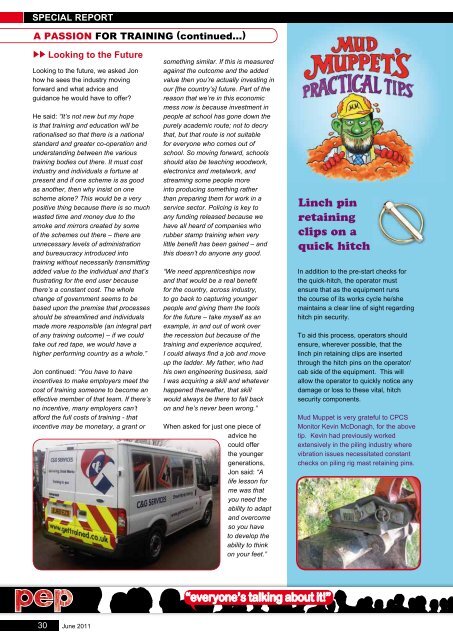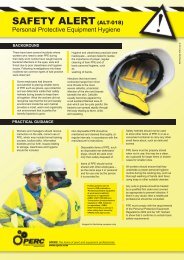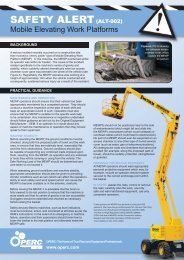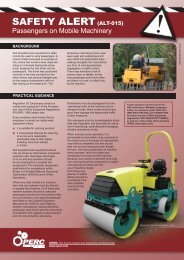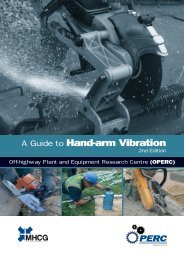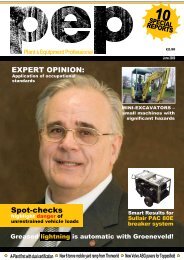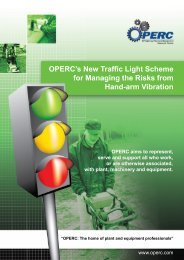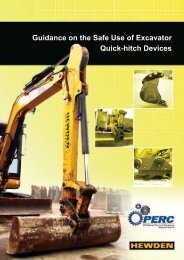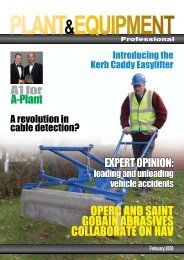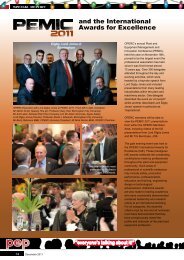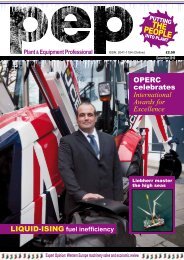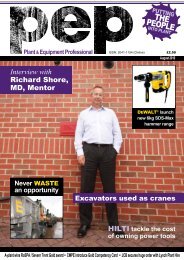expert opinion: - OPERC - Off-highway Plant and Equipment ...
expert opinion: - OPERC - Off-highway Plant and Equipment ...
expert opinion: - OPERC - Off-highway Plant and Equipment ...
Create successful ePaper yourself
Turn your PDF publications into a flip-book with our unique Google optimized e-Paper software.
SPECIAL REPoRT<br />
a Passion for training (continued...)<br />
30<br />
Looking to the Future<br />
Looking to the future, we asked Jon<br />
how he sees the industry moving<br />
forward <strong>and</strong> what advice <strong>and</strong><br />
guidance he would have to offer?<br />
He said: “It’s not new but my hope<br />
is that training <strong>and</strong> education will be<br />
rationalised so that there is a national<br />
st<strong>and</strong>ard <strong>and</strong> greater co-operation <strong>and</strong><br />
underst<strong>and</strong>ing between the various<br />
training bodies out there. It must cost<br />
industry <strong>and</strong> individuals a fortune at<br />
present <strong>and</strong> if one scheme is as good<br />
as another, then why insist on one<br />
scheme alone? This would be a very<br />
positive thing because there is so much<br />
wasted time <strong>and</strong> money due to the<br />
smoke <strong>and</strong> mirrors created by some<br />
of the schemes out there – there are<br />
unnecessary levels of administration<br />
<strong>and</strong> bureaucracy introduced into<br />
training without necessarily transmitting<br />
added value to the individual <strong>and</strong> that’s<br />
frustrating for the end user because<br />
there’s a constant cost. The whole<br />
change of government seems to be<br />
based upon the premise that processes<br />
should be streamlined <strong>and</strong> individuals<br />
made more responsible (an integral part<br />
of any training outcome) – if we could<br />
take out red tape, we would have a<br />
higher performing country as a whole.”<br />
Jon continued: “You have to have<br />
incentives to make employers meet the<br />
cost of training someone to become an<br />
effective member of that team. If there’s<br />
no incentive, many employers can’t<br />
afford the full costs of training - that<br />
incentive may be monetary, a grant or<br />
June 2011<br />
something similar. If this is measured<br />
against the outcome <strong>and</strong> the added<br />
value then you’re actually investing in<br />
our [the country’s] future. Part of the<br />
reason that we’re in this economic<br />
mess now is because investment in<br />
people at school has gone down the<br />
purely academic route; not to decry<br />
that, but that route is not suitable<br />
for everyone who comes out of<br />
school. So moving forward, schools<br />
should also be teaching woodwork,<br />
electronics <strong>and</strong> metalwork, <strong>and</strong><br />
streaming some people more<br />
into producing something rather<br />
than preparing them for work in a<br />
service sector. Policing is key to<br />
any funding released because we<br />
have all heard of companies who<br />
rubber stamp training when very<br />
little benefit has been gained – <strong>and</strong><br />
this doesn’t do anyone any good.<br />
“We need apprenticeships now<br />
<strong>and</strong> that would be a real benefit<br />
for the country, across industry,<br />
to go back to capturing younger<br />
people <strong>and</strong> giving them the tools<br />
for the future – take myself as an<br />
example, in <strong>and</strong> out of work over<br />
the recession but because of the<br />
training <strong>and</strong> experience acquired,<br />
I could always find a job <strong>and</strong> move<br />
up the ladder. My father, who had<br />
his own engineering business, said<br />
I was acquiring a skill <strong>and</strong> whatever<br />
happened thereafter, that skill<br />
would always be there to fall back<br />
on <strong>and</strong> he’s never been wrong.”<br />
When asked for just one piece of<br />
advice he<br />
could offer<br />
the younger<br />
generations,<br />
Jon said: “A<br />
life lesson for<br />
me was that<br />
you need the<br />
ability to adapt<br />
<strong>and</strong> overcome<br />
so you have<br />
to develop the<br />
ability to think<br />
on your feet.”<br />
“everyone’s talking about it!”<br />
Linch pin<br />
retaining<br />
clips on a<br />
quick hitch<br />
In addition to the pre-start checks for<br />
the quick-hitch, the operator must<br />
ensure that as the equipment runs<br />
the course of its works cycle he/she<br />
maintains a clear line of sight regarding<br />
hitch pin security.<br />
To aid this process, operators should<br />
ensure, wherever possible, that the<br />
linch pin retaining clips are inserted<br />
through the hitch pins on the operator/<br />
cab side of the equipment. This will<br />
allow the operator to quickly notice any<br />
damage or loss to these vital, hitch<br />
security components.<br />
Mud Muppet is very grateful to CPCS<br />
Monitor Kevin McDonagh, for the above<br />
tip. Kevin had previously worked<br />
extensively in the piling industry where<br />
vibration issues necessitated constant<br />
checks on piling rig mast retaining pins.


